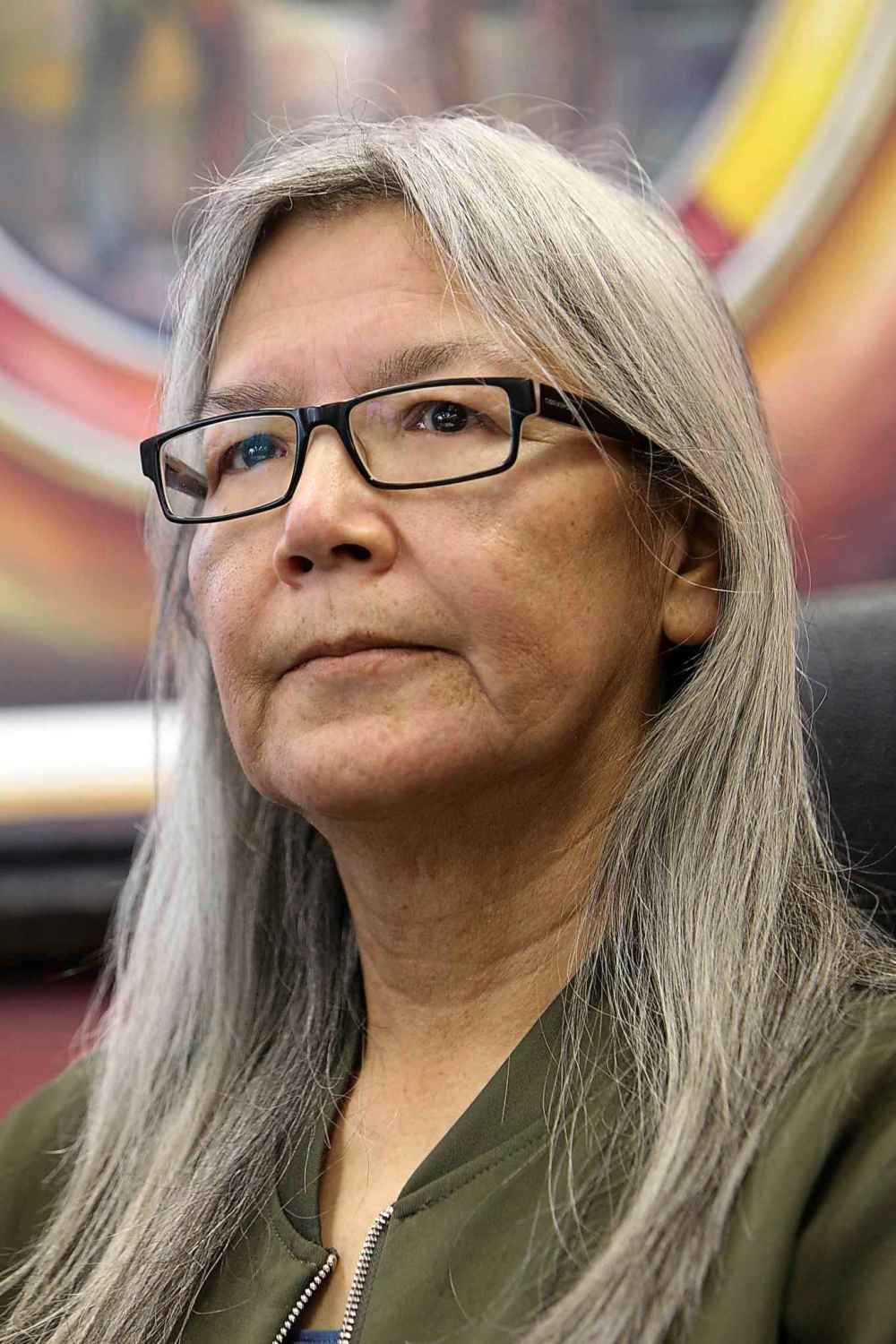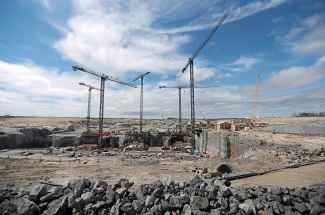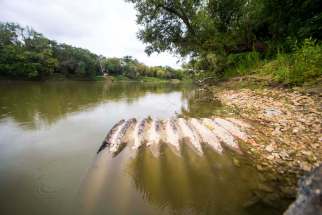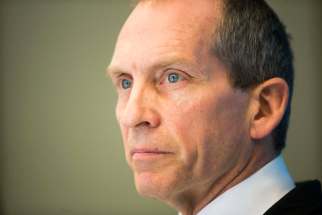Worker environment woes at Keeyask persist, War Lake chief says
Read this article for free:
or
Already have an account? Log in here »
To continue reading, please subscribe:
Monthly Digital Subscription
$0 for the first 4 weeks*
- Enjoy unlimited reading on winnipegfreepress.com
- Read the E-Edition, our digital replica newspaper
- Access News Break, our award-winning app
- Play interactive puzzles
*No charge for 4 weeks then price increases to the regular rate of $19.00 plus GST every four weeks. Offer available to new and qualified returning subscribers only. Cancel any time.
Monthly Digital Subscription
$4.75/week*
- Enjoy unlimited reading on winnipegfreepress.com
- Read the E-Edition, our digital replica newspaper
- Access News Break, our award-winning app
- Play interactive puzzles
*Billed as $19 plus GST every four weeks. Cancel any time.
To continue reading, please subscribe:
Add Free Press access to your Brandon Sun subscription for only an additional
$1 for the first 4 weeks*
*Your next subscription payment will increase by $1.00 and you will be charged $16.99 plus GST for four weeks. After four weeks, your payment will increase to $23.99 plus GST every four weeks.
Read unlimited articles for free today:
or
Already have an account? Log in here »
Hey there, time traveller!
This article was published 29/08/2018 (2661 days ago), so information in it may no longer be current.
Racism and drug abuse run rampant among employees at Manitoba Hydro’s latest megaproject, despite changes made by the Crown corporation to try to curb such behaviours, one northern chief says.
Although Hydro followed up on 64 recommendations for improvements made in 2017 by an independent consulting firm, War Lake First Nation Chief Betsy Kennedy said she still fields calls from concerned members of her community working at the Keeyask generating station site.
About 30 War Lake members are working at Keeyask, she said Wednesday.

“I don’t put up with any kind of racism at Keeyask. So if there’s anything happening with my members, I’m directly involved right away. I go to all the people and talk to them,” Kennedy said, adding she visits the site at least four times a year.
The chief said workers have come to her with complaints about not being treated fairly. Hydro does have a harassment and discrimination-free workplace standard at Keeyask, but not everyone seems to be following the protocol, she said.
Hydro spokesperson Bruce Owen affirmed the utility is doing its best to assure its large workforce acts appropriately.
“Ensuring the… workplace standard is well-understood, and that all employers are clear and consistent in their expectations for respectful behaviour, is important when you have more than 3,000 employees at site from all over the world, from all kinds of cultural backgrounds, doing all kinds of different jobs,” he said by email. “We will work with all our partners on the project going forward to review and enhance our training and communications programs.
“To be clear: even one case of an employee experiencing discrimination or harassment is too much.”
Kennedy said she’s heard there is random drug testing happening for Keeyask workers, though Owen said that was not true.
War Lake, Tataskweyak, York Factory and Fox Lake First Nations are all partners with Hydro on the Keeyask project, located about 725 kilometres northeast of Winnipeg on the lower Nelson River.
The area’s MP, Niki Ashton, said she’s heard rumours of drug activity at Keeyask and concerns for public safety.
“I know there’s been talk of the challenges including drugs that have arisen, alongside the increased income that some are making,” she said over the weekend.
In a brief phone call Wednesday, Tataskweyak councillor Robert Garson questioned the legitimacy of the Keeyask employee surveys conducted by D. Carriere & Associates in 2016, and its subsequent recommendations to improve the work environment.
“Right off the bat, it looked okay with the recommendations, but there was something missing and then some other member from York Landing pointed it out… They did tell Manitoba Hydro, ‘This is cosmetic and it’s very shallow.’ And they (Hydro) gave me a whole bunch of excuses,” Garson said.
The consulting firm recommended reviewing Keeyask’s drug and alcohol policy for employees, prioritizing Indigenous awareness training, and making conflict resolution training mandatory for all managers, among other ideas.
Fox Lake reaches out to Bear Clan
Winnipeg’s Bear Clan Patrol is heading to Fox Lake Cree Nation next month to help hatch a plan to eradicate drugs, exploitation and abuse from the North, much of which is stemming from construction camps connected to the Keeyask generating station project, the volunteer group’s founder says.
James Favel said he was asked by Manitoba Hydro officials and Fox Lake chief executive officer Robert Wavey to visit the remote northern community.
He’s being flown out Sept. 17, and hopes to meet with members of the four First Nations most closely involved with the Hydro megaproject: Fox Lake, York Factory First Nation, Tataskweyak Cree Nation and War Lake First Nation.
“They were talking about the man camps (associated with Keeyask) and some of the problems they’ve got coming up. They’ve got a lot of drug use and stuff like that going on there, and they wanted some support,” Favel said.
“When the money comes and people come, it brings drugs and exploitation and abuse.”
Disturbing testimony at hearings and in published reports (including one from the Clean Environment Commission, released last week) have highlighted claims of racism, harassment and abuse experienced by First Nations in proximity to northern Hydro projects for nearly two decades. The CEC report spurred the province to call for an RCMP investigation into historical allegations of sexual abuse at the hands of Hydro workers in Fox Lake.
“It shows that there’s a serious need there. They started coming up to me months ago already, so it’s not in response to this report that I’m going up there. It’s something that’s been ongoing for a few months already,” Favel said Wednesday.
Hydro spokesperson Scott Powell confirmed the Crown corporation first reached out to the Bear Clan in July, on behalf of their partners who expressed interest in establishing a like-minded program.
“So we contacted Bear Clan to see if they would be interested in assisting with this in the north (to which they replied absolutely) and then provided their contact information to our partner communities,” Powell said in an email.
“We have also had a few of our employees in Gillam ask how they can volunteer to assist with the group and help our partners on their own time. A healthy, safe community is in everybody’s best interests.”
Another report by an independent consultancy firm published in 2017 outlined serious workplace culture flaws at Keeyask. D. Carriere & Associates made 64 recommendations for improvements and Hydro said all have been completed or are currently underway.
The consultants also mentioned issues surrounding drug and alcohol smuggling at Keeyask, which is located about 725 kilometres northeast of Winnipeg on the lower Nelson River.
Favel said those he’s spoken with have voiced concerns about ongoing substance abuse and he hopes the Bear Clan community safety model can help empower the affected communities to address their own needs.
“That’s what it’s done for us here (in Winnipeg), and I hope it does the same for them up there,” Favel said. “We’re not transporting Bear Clan from here to there. It’s got to be done by their own community members and I think it will help to strengthen the community.
“I think it will help to bring people together.”
-Jessica Botelho-Urbanski
“(Hydro) rationalized and justified (the report) and now they’re trumpeting it. It’s almost like an insult what they’re doing,” Garson said. “It’s just common practise for them to be on the defensive, and I don’t see why they have to be on the defensive in the first place. If they worked with us, they wouldn’t have to be in this position.”
Hydro has paid more than $800 million in mitigation, remediation and compensation costs to northern communities affected by its developments, according to a Clean Environment Commission report released last week.
Kennedy said no amount of money will ever make up for Hydro’s impact on northern Indigenous communities, and welcomed Minister of Indigenous and Northern Relations Eileen Clarke to pay them a visit and hear their stories.
On Wednesday, the minister’s press secretary said Clarke is consulting with the communities to determine an appropriate time to visit.
In the CEC report, Fox Lake members outlined incidents of sexual violence perpetuated against them by Hydro workers and RCMP. Kennedy said such stories were an open secret in the North for years, but no one knew how to deal with them.
“We had seen things that were happening in Gillam a long time ago. And for us, we were devastated because we do have relatives there also. But it wasn’t new. We just didn’t know how to handle it,” she said.
The province asked the RCMP to look into the historical allegations of abuse. The police force then contacted the Independent Investigation Unit of Manitoba, which is determining next steps forward.
— with files from Dylan Robertson
jessica.botelho@freepress.mb.ca
Twitter: @_jessbu

















